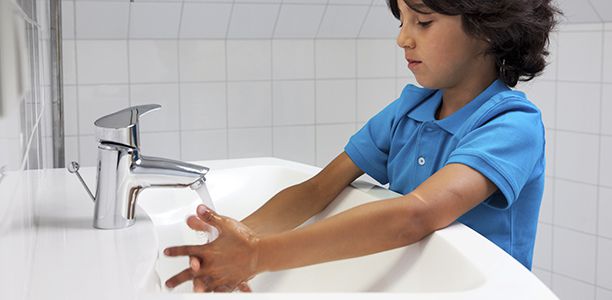Teaching children about hand washing early in life is important. Hand washing prevents the spread of diseases which make children sick. When kids learn early in life, hand washing is more likely to become a habit they’ll practice for the rest of their lives.
Children are ready to learn about hand washing when they are still very young. Most children develop the ability to wash their hands independently by about three years of age. Before that you’ll need to help them wash their hands (or for babies and young toddlers, you might need to do it for them). After age three, your children will probably still need a bit of help.
But even when they know how to do it, kids don’t always take time out to wash their hands. You’ll almost certainly need to give them lots of encouragement and reminders. Kids don’t always enjoy washing their hands, partly because it means time out from more exciting things like playing. So the best strategy is to find ways to make hand washing part of the fun, rather than a distraction from their favourite activities.
Provide appropriate hand washing facilities
A good place to start is by ensuring that you have facilities that are appropriate for your child’s age. If the basin is too high for their little legs or the bar of soap too big for their little hands, your children will be less likely to wash their hands properly. You might need to place a stool by the sink so they can reach it. For more information about setting up hand washing facilities for kids.
It’s important to think about hand washing facilities while you’re out and about. If you’re holding an outdoor event for children such as a birthday party, outdoor hand washing facilities should be provided. Alcohol-based hand rubs can be carried for times when soap and water are not available for washing hands, for example if you are hiking in a national park or at the local park (which may have running water but may not have soap or hand drying facilities). Other public places like shopping centres and train stations have hand washing facilities, but they’re probably very different from the bathroom sink at home (and present different challenges for kids trying to keep their hand hygienically clean). For example, they may not have stools to help your child reach the sink. Air dryers commonly found in public toilets may take a bit of getting used to for kids who have not used them before- all that noise and hot air can be frightening for a child that doesn’t understand what’s going on.
Teach children why hand washing is important
Children are more likely to wash their hands if they understand why it’s important. However because kids learn by using their senses (by touching, seeing, tasting, smelling and hearing) understanding why hands need to be washed can be difficult. The germs that need to be washed off hands can’t be seen, smelt or heard, so it’s little wonder young children have difficulty comprehending why they need to wash their hands. Learn more about why hand washing is so important.
Talk to your child about hand washing and why it’s important as you go about your daily routines, so they can relate hand hygiene to their everyday experiences. For example, if your child is helping you do the cooking, wash your hands before you start and talk to your child about why it’s important. If they lick their fingers during cooking, talk about why they need to wash their hands again, and help them or supervise them while they do it. It also makes learning about hand washing more fun and relaxed. Read more about when children should was their hands.
When teaching your child to wash their hands, it’s important to find ways to help your child understand that even if their hands look clean, they may house germs which can make them sick. Just talking to them is one strategy and you could discuss things like:
- Germs being everywhere, even though they can’t see them;
- Germs causing illness if they get inside a person’s body, for example through the nose or mouth;
- Different types of germs (e.g. viruses and bacteria) causing different types of illnesses (although this is more appropriate for children in primary school);
- Soap and water washing germs away during hand washing.
There are also many games and activities you can use to make learning about how germs spread and why you need to wash with soap and water to remove the germs fun, for example Glitter germs.
Be a hand washing role model
Letting your children see you washing your own hands is one of the best things you can do to teach them about the importance of washing their own hands. Wash your hands at important times during the day (e.g. after using the toilet) and when you’re helping your child wash their hands, give yours a scrub as well. Make sure it’s a scrub, not a splash you don’t want to inadvertently teach your kids that a few drops of water is enough to get germs away! Learn how to wash hands properly.
Make hand washing part of your routine
Making hand washing part of your daily routine will help your children realise its importance and ensure they have the time to do it properly. Put time aside for hand washing at appropriate times (e.g. before eating, after toileting) throughout the day. Give your children plenty of time to wash their hands properly at other times, for example after play. Don’t try to hurry them- hand washing skills are more likely to develop if they’re relaxed and have all the time they need.
Encourage your children to wash their hands properly
Encouraging children and taking the time needed to reinforce positive hand washing behaviour is an important step in developing your child’s hand washing skills. Discuss hand washing rules, for example that they must use soap and running water. Read more about how toddlers and children should wash their hands.
Supervise your children as they wash their hands
If your child is still young, you’ll need to play a more active role and wash their hands for them. But pay attention to your child’s cues- you’ll need to judge when they are ready to have a go at doing it for themselves, and how much help you should give them.
Pay attention to what they do right, not what they do wrong
Don’t be disappointed if your child doesn’t master hand washing straight away. Like all other skills, learning how to wash the hands properly takes time. Even if your child doesn’t wash their hands perfectly the first time, reinforce what they did right, for example if they remembered to wash their hands at an important time (or if they tried to wash with soap), it’s important to let your child know you noticed their effort. You could say something like, ‘you’re very grown up now, you remember to use soap all on your own.
Reward your children for washing their hands
Until hand washing is a habit for your children, rewarding them when they do it correctly is a great way to make them want to wash their hands. You don’t need to spend a fortune. A simple star chart where your child sticks a star (or puts a mark with a pen) each time they wash their hands is probably all you need. Young children will probably feel proud and satisfied knowing that they are able to care for themselves, so just congratulating them may be all the reward they need.
Give clear hand washing instructions
When asking your child to wash their hands, give them clear instructions so they know exactly what you want them to do. For example you might mention things like standing on the stool so they can reach the tap, lathering with soap, and drying the hands when they’re done. Provide verbal instructions throughout hand washing to help them get it right, for example remind them to keep lathering the soap for 20 seconds. You could also place step-by-step hand washing guides (make sure they use pictures which clearly show your child what to do) so that the instructions are there, even when you’re not.
If your child doesn’t seem to understand, show them how it’s done by washing your own hands. You might also need to help your child if there are parts of the hand washing routine they have difficulty with. Praise all their attempts to let them know you see them trying and encourage them to do it again. This is especially important when your child is first learning to do it themselves, as they may feel discouraged if they think they are doing the wrong thing.
Remind them to wash their hands
Young children need to be taught and reminded when it is important to wash their hands, for example before touching food or after playing. One obvious way to remind them is by asking if they’ve washing their hands. You could also place reminders around the house so your children get the message, even if you’re not around. Make the hand washing reminders appealing for children (for example use bright colours and fun pictures) and place them at your child’s eye level so they can’t miss them. You could even get your children to make their own hand washing posters. Place them in places where children are likely to need reminding- this includes more obvious places like the toilet, and less obvious places like the playroom.
Make hand washing fun
There are many things you can do to make hand washing fun. For example you could:
- Wash your hands with them.
- Sing songs while you wash. It’s a good strategy to prevent your child rushing the process. Washing hands properly takes about the same length of time as it takes to sing the ‘Happy Birthday’ song twice, so use that as a guide. But you could sing a special hand washing song.
- Count with them while they’re washing. You’ll be developing their mathematical skills and also helping them learn how long proper hand washing takes.
- Use a chart which your child can mark off or put a star on each time they wash their hands.
- Play a guessing game, for example ask your child to guess how many more times they’ll be able to wash their hands with the soap that’s left in the liquid soap dispenser.
You might also like…
 |
More information about handwashing techniques and activities for kids. |
References
- National Childcare Accreditation Council Inc. Supporting children’s hygiene skills. 2009. (cited 19 January 2014). Available from: (PDF File)
- Vanderbilt University. Teaching your child to become independent with daily routines. 2010. (cited 19 January 2014). Available from: (PDF File)
- Columbus Public Health. Teaching hand washing to young children. 2012. (cited 19 January 2014). Available from: (PDF File)
- London Borough of Lewisham. Food safety at outdoor and temporary events. 2010. (cited 19 January 2014). Available from: (PDF File)
- Mayo Clinic. Hand washing- dos and don’ts. 2011. (cited 19 January 2014). Available from: (URL Link) and (URL Link)
- Massachusetts Department of Health and Human Services. Handwashing lesson plans for Kindergarten – Grade Six. 2008. (cited 19 January 2014). Available from: (PDF File)
- National Health and Medical Research Council. 2013. Staying healthy- preventing infectious diseases in early childhood education. 5th Ed. (cited 19 January 2014). Available from: (PDF File)
- Abraham K, Curriculum ideas for exploring handwashing. 2005. (cited 14 September 2013). Available from: (PDF File)




 (13 votes, average: 3.77 out of 5)
(13 votes, average: 3.77 out of 5) 






